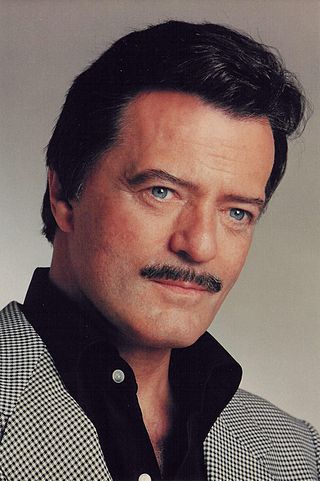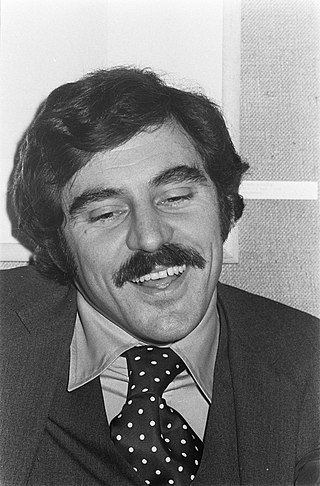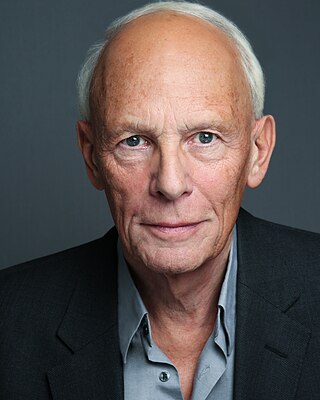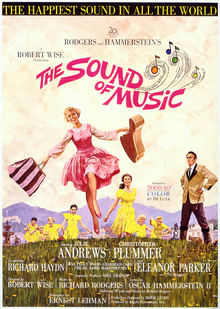See also
- The Sound of Musicals , a 2006 BBC series of musical performances
- The Sound of Silence (disambiguation)
The Sound of Music is a 1959 musical by Rodgers and Hammerstein.
The Sound of Music may also refer to:

The Sound of Music is a musical with music by Richard Rodgers, lyrics by Oscar Hammerstein II, and a book by Howard Lindsay and Russel Crouse. It is based on the 1949 memoir of Maria von Trapp, The Story of the Trapp Family Singers. Set in Austria on the eve of the Anschluss in 1938, the musical tells the story of Maria, who takes a job as governess to a large family while she decides whether to become a nun. She falls in love with the children, and eventually their widowed father, Captain von Trapp. He is ordered to accept a commission in the German navy, but he opposes the Nazis. He and Maria decide on a plan to flee Austria with the children. Many songs from the musical have become standards, including "Do-Re-Mi", "My Favorite Things", "Edelweiss", "Climb Ev'ry Mountain", and the title song "The Sound of Music".

A soundtrack is recorded sound accompanying and synchronised to the images of a book, drama, motion picture, radio program, television program, or video game; colloquially, a commercially released soundtrack album of music as featured in the soundtrack of a film, video, or television presentation; or the physical area of a film that contains the synchronised recorded sound.

Petula Clark CBE is a British singer, actress, and songwriter. She started her professional career as a child performer and has had the longest career of any British entertainer, spanning more than 81 years.

John Barry Prendergast was an English composer and conductor of film music.

Porgy and Bess is an English-language opera by American composer George Gershwin, with a libretto written by author DuBose Heyward and lyricist Ira Gershwin. It was adapted from Dorothy Heyward and DuBose Heyward's play Porgy, itself an adaptation of DuBose Heyward's 1925 novel Porgy.

Robert Gérard Goulet was an American and Canadian singer and actor of French-Canadian ancestry. Goulet was born and raised in Lawrence, Massachusetts, until age 13, and then spent his formative years in Canada. Cast as Sir Lancelot and originating the role in the 1960 Broadway musical Camelot starring opposite established Broadway stars Richard Burton and Julie Andrews, he achieved instant recognition with his performance and interpretation of the song "If Ever I Would Leave You", which became his signature song. His debut in Camelot marked the beginning of a stage, screen, and recording career. A Grammy Award winner, his career spanned almost six decades. He starred in a 1966 television version of Brigadoon, a production which won five primetime Emmy Awards. In 1968, he won the Tony Award for Best Actor in a Musical for The Happy Time, a musical about a French-Canadian family set in Ottawa.

Anthony Newley was an English actor, singer, songwriter, and filmmaker. A "latter-day British Al Jolson", he achieved widespread success in song, and on stage and screen. "One of Broadway's greatest leading men", from 1959 to 1962 he scored a dozen entries on the UK Top 40 chart, including two number one hits. Newley won the 1963 Grammy Award for Song of the Year for "What Kind of Fool Am I?", sung by Sammy Davis Jr., and wrote "Feeling Good", which became a signature hit for Nina Simone. His songs have been sung by a wide variety of singers including Fiona Apple, Tony Bennett, Barbra Streisand, Michael Bublé and Mariah Carey.
Hairspray may refer to:
A cast recording is a recording of a stage musical that is intended to document the songs as they were performed in the show and experienced by the audience. An original cast recording or OCR, as the name implies, features the voices of the show's original cast. A cast recording featuring the first cast to perform a musical in a particular venue is known, for example, as an "original Broadway cast recording" (OBCR) or an "original London cast recording" (OLCR).
Catch Me If You Can is a 2002 film directed by Steven Spielberg.
John Valmore Pearson was a British composer, orchestra leader and pianist. He led the Top of the Pops orchestra for sixteen years, wrote a catalogue of library music, and had many of his pieces used as the theme music to television series.
Cinderella is a classic fairy tale.
A soundtrack album is any album that incorporates music directly recorded from the soundtrack of a particular feature film or television show. The first such album to be commercially released was Walt Disney's Snow White and the Seven Dwarfs, the soundtrack to the film of the same name, in 1938. The first soundtrack album of a film's orchestral score was that for Alexander Korda's 1942 film Rudyard Kipling's Jungle Book, composed by Miklós Rózsa.

Vincent Hill was an English traditional pop music singer, best known for his cover version of the Rodgers and Hammerstein show tune "Edelweiss" (1967), which reached No. 2 on the UK Singles Chart. He recorded 25 studio albums and several soundtracks, wrote songs and plays and hosted TV shows during the 1970s and 1980s, including They Sold a Million (BBC), Musical Time Machine (BBC) and the chat show Gas Street (ITV). Outside of his work in show business, he was a patron of the Macular Society, a UK charity for anyone affected by central vision loss.

Paul Nicholas is an English actor and singer, best known for his work in the 1983 BBC sitcom Just Good Friends. The show won a BAFTA and Nicholas was nominated for best comedy performance.

The Sound of Music is a 1965 American musical drama film produced and directed by Robert Wise from a screenplay written by Ernest Lehman, and starring Julie Andrews and Christopher Plummer, with Richard Haydn, Peggy Wood, Charmian Carr, and Eleanor Parker. The film is an adaptation of the 1959 stage musical, composed by Richard Rodgers, with lyrics by Oscar Hammerstein II and a book by Lindsay and Crouse. Based on the 1949 memoir The Story of the Trapp Family Singers by Maria von Trapp, the film is set in Salzburg, Austria, and is a fictional retelling of her experiences as governess to seven children, her eventual marriage with their father Captain Georg von Trapp, and their escape during the Anschluss in 1938.
"The Sound of Music" is the title song from the musical of the same name that premiered in 1959. It was composed by Richard Rodgers with lyrics written by Oscar Hammerstein II. The song introduces the character of Maria, a young novice in an Austrian abbey.
Funny Girl may refer to:
"Something Good" is a song written by Richard Rodgers for the 1965 film version of the 1959 stage musical The Sound of Music. It replaced the original song sung by Maria and Captain Georg von Trapp called "An Ordinary Couple". Since then the song has been used in the various reproductions of the play and most recently the 2015 television special, The Sound of Music Live.

Rick Shutter is an American drummer and percussionist. He performed in the band for the original New York production of Godspell at the age of 19 and for the soundtracks of the play and subsequent film adaptation. He has also been credited as Ricky Shutter and Riki Shutter.